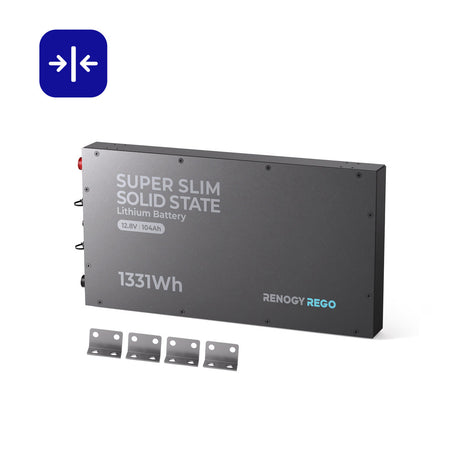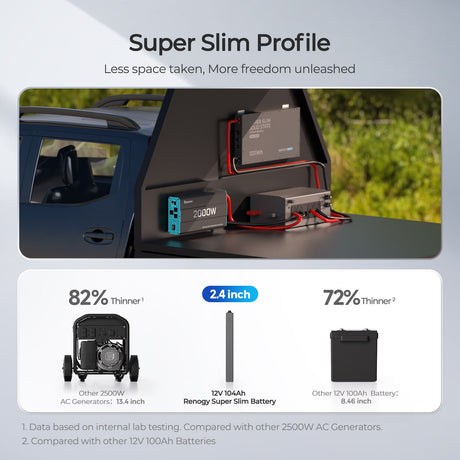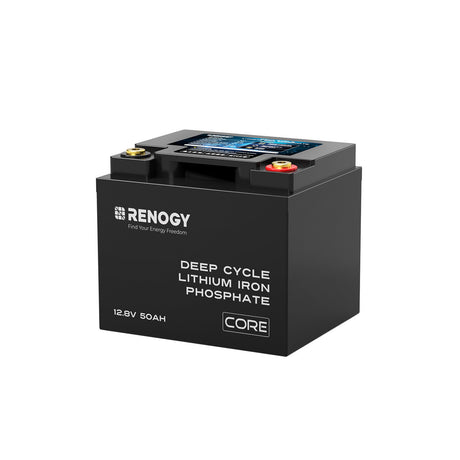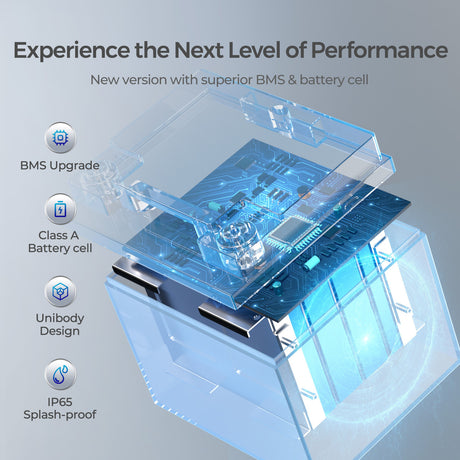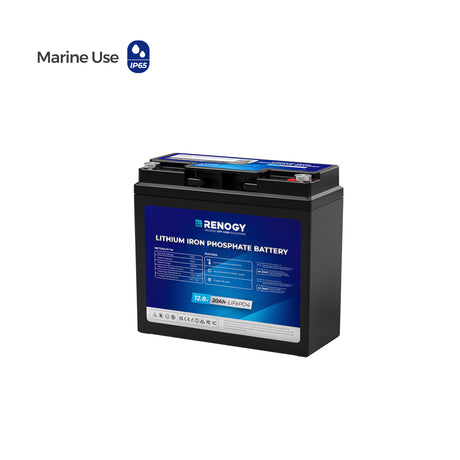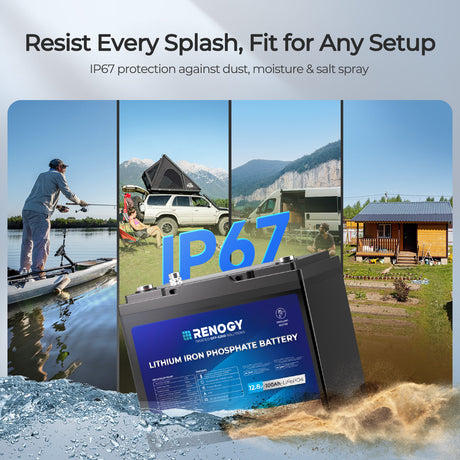Labour Day Weekend Sale
Aug. 29-Sep. 1 Only
-
Renogy
De CAD$1,159.99CAD$1,399.99Prix unitaire /Indisponible -
Renogy
Renogy Core - Batterie lithium fer phosphate 12 V 200 Ah avec Bluetooth
De CAD$699.99CAD$819.99Prix unitaire /Indisponible -
Renogy
De CAD$899.99CAD$1,199.99Prix unitaire /Indisponible -
Renogy
From C$299.99 Each
Batterie lithium-fer-phosphate Renogy Core Mini 12 V 300 Ah
De CAD$299.99CAD$379.99Prix unitaire /Indisponible -
Renogy
Renogy Core – Batterie lithium-fer-phosphate à décharge profonde 24 V 100 Ah
De CAD$699.99CAD$1,029.99Prix unitaire /Indisponible
Renogy
De CAD$1,159.99CAD$1,399.99Prix unitaire /IndisponibleRenogy
From C$299.99 Each
Batterie lithium-fer-phosphate Renogy Core Mini 12 V 300 Ah
De CAD$299.99CAD$379.99Prix unitaire /IndisponibleRenogy
Renogy Core - Batterie lithium fer phosphate 12 V 200 Ah avec Bluetooth
De CAD$699.99CAD$819.99Prix unitaire /IndisponibleRenogy
De CAD$899.99CAD$1,199.99Prix unitaire /IndisponibleRenogy
De CAD$599.99CAD$709.99Prix unitaire /IndisponibleRenogy
Batterie lithium-fer-phosphate Renogy DuoHeat Tech Core Mini 12 V 100 Ah
De CAD$419.99CAD$499.99Prix unitaire /IndisponibleRenogy
Renogy Core - Batterie LiFePO4 12 V 100 Ah pour moteur de pêche à la traîne avec Bluetooth
De CAD$359.99CAD$449.99Prix unitaire /IndisponibleRenogy
Renogy Core – Batterie lithium-fer-phosphate à décharge profonde 24 V 100 Ah
De CAD$699.99CAD$1,029.99Prix unitaire /IndisponibleRenogy
Renogy REGO - Batterie lithium-fer-phosphate ultra-fine 12,8 V 104 Ah
De CAD$969.99CAD$1,099.99Prix unitaire /IndisponibleRenogy
De CAD$659.99CAD$849.99Prix unitaire /IndisponibleRenogy
Renogy Core – Batterie lithium-fer-phosphate à décharge profonde 12 V 50 Ah
De CAD$209.99CAD$249.99Prix unitaire /IndisponibleRenogy
Batterie lithium-fer-phosphate Renogy Core 12 V 20 Ah pour moteur de pêche à la traîne
De CAD$129.99CAD$149.99Prix unitaire /Indisponible
Frequently Asked Questions
What is a deep cycle battery?
What is a deep cycle battery?
Think of a deep cycle battery as the reliable power source for your off-grid adventures. It's specifically built to provide a steady, consistent flow of energy over many hours, perfect for running all your gear. Unlike a car battery that delivers a quick jolt to start an engine, a deep cycle battery is designed to be deeply discharged and recharged many times over its lifespan.
What is the difference between a normal battery and a deep cycle battery?
What is the difference between a normal battery and a deep cycle battery?
A regular car battery, often called a starter battery, is built for a different purpose entirely. It's made with thin, porous lead plates to give a quick, powerful burst of energy to get your engine going. A deep cycle battery, on the other hand, is a whole different beast. Its robust, thicker plates are designed to handle repeated deep discharges—down to 80% of its capacity—without suffering damage. This makes it the go-to choice for powering everything from your cabin lights to your RV's appliances.
How many years will a deep cycle battery last?
How many years will a deep cycle battery last?
How long a deep cycle battery lasts really depends on the type you choose and how you use it. For a standard lead-acid battery, you can generally expect about 3 to 5 years, with a life cycle of 300 to 1,000 charges. However, a high-quality lithium battery is in a league of its own, lasting for 10 to 15 years or more and offering thousands of cycles. Taking good care of your battery is key to extending its life, no matter the type.
What kills a deep cycle battery?
What kills a deep cycle battery?
Most of the time, a deep cycle battery's life is cut short by improper use. The most common culprits are letting it completely die or charging it incorrectly. Repeatedly discharging a lead-acid battery below 50% can cause irreversible damage. Just as bad is overcharging or undercharging it, which can shorten its lifespan. And for those in a cold Canadian climate, letting a lead-acid battery sit in a discharged state can even cause it to freeze and crack.
Do deep cycle batteries lose charge when not in use?
Do deep cycle batteries lose charge when not in use?
Yes, they do. Every battery has a natural process called self-discharge, which means it will slowly lose its charge when it's just sitting there. The rate varies, but lead-acid batteries tend to lose their charge faster than lithium batteries. If you plan to store your battery for a while, it's best to fully charge it beforehand and periodically check on it to make sure it stays topped up.
Do I need a special charger for lithium batteries in my RV?
Do I need a special charger for lithium batteries in my RV?
Yes, you definitely do. A lithium battery requires a very specific charging profile to operate safely and efficiently. You can't just use a standard lead-acid battery charger, as that can seriously damage your lithium battery. You'll need a charger or a solar charge controller that's specifically designed for lithium technology.
How do I properly charge a lithium battery?
How do I properly charge a lithium battery?
To charge your lithium battery correctly, you need a compatible charger or solar controller. Your battery's built-in Battery Management System (BMS) takes care of the hard part, regulating the voltage and current to keep everything safe and balanced. Just make sure you're using the right equipment and that you're charging within the battery's recommended temperature range.
How do Renogy lithium batteries perform in cold Canadian weather?
How do Renogy lithium batteries perform in cold Canadian weather?
We designed our lithium batteries with Canada's tough winters in mind. Many of our models feature an intelligent, built-in self-heating function. This handy feature automatically activates when the battery's internal temperature drops below freezing and you apply a charging current. This ensures your battery can safely and efficiently accept a charge.
Is it okay to leave a lithium-ion battery on the charger all the time?
Is it okay to leave a lithium-ion battery on the charger all the time?
Yes, you can. Modern lithium batteries with a reliable BMS are smart enough to manage themselves. Once the battery reaches a full charge, the charger will automatically switch to a "float" or maintenance mode, so you don't have to worry about overcharging. It's one of the great things about this technology—you can set it and forget it.
Can you connect Renogy Lithium batteries in parallel or series?
Can you connect Renogy Lithium batteries in parallel or series?
Most Renogy lithium batteries can be connected in both series (to increase voltage) and parallel (to increase capacity), but it's essential to ensure all batteries are of the same brand, model, and capacity. For series connections, you can connect up to 4 batteries to achieve higher voltages. For parallel connections, ensure batteries are of the same model, capacity, and state of charge. However, not all lithium iron phosphate (LiFePO4) batteries can be connected in series or parallel such as golf cart batteries. Please note that while most Renogy Lithium batteries can be wired in series for a higher voltage, none are rated to exceed 48V maximum.
How to charge a lithium battery without a charger?
How to charge a lithium battery without a charger?
Warning: It's extremely dangerous to try and charge a lithium battery without a proper, compatible charger. This can cause a fire or explosion.
The only safe way to charge a lithium battery is with a device specifically designed for it. This could be a solar charge controller that regulates power from your solar panels, a DC-to-DC charger that uses your vehicle's alternator, or a standard AC wall charger. These tools ensure the correct voltage and current are applied, keeping you and your equipment safe.


















